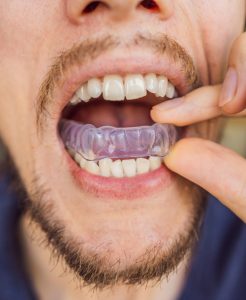Teeth Grinding
Grinding your teeth when not eating food is referred to in the dental community as bruxism. Constant grinding and clenching can cause your teeth to wear down over time. This can result in your teeth becoming shorter and prone to breakage. In addition to damaging the teeth themselves, you can develop face pain, jaw stiffness, headaches, insomnia, or depression as a result of bruxism. When your jaw is tense most of the day and night, it will undoubtedly create a multitude of further issues.


The procedure itself will only take a short time, causes only very minor discomfort which can be relieved with an ice pack, and the results will become clear in as little as several days to a week. Although not a permanent remedy, relief in symptoms caused by teeth grinding can last up to three months after Botox injections. Once symptoms return, treatment will need to be repeated.
If you or a loved one suffers from pain and complications resulting from teeth grinding, contact us to learn more about how Botox might be the answer.
Same-Day Crowns – While You Wait
Instantly complete your smile after you’ve had an extraction. Jon Frankel Dentistry offers same-day crowns using our CEREC technology. We can mold and mill the crowns while you wait, helping you restore your beautiful smile in about an hour.
What Our Patients Are Saying
Frankel Dentistry (Toledo)
5012 Talmadge Road, Toledo, OH 43623
Phone: (419) 474-9611 | Fax: (419) 474-1902
Hours
| Monday & Tuesday: | 7:30am -8:00pm |
| Wednesday & Thursday: | 7:30am -5:00pm |
| Friday: | 7:30am -2:30pm |
| Every other Saturday | 8:00am – 12:00pm |
Frankel & Puhl Dentistry (Maumee)
4359 Keystone Dr, Maumee, OH 43537
Phone: (419) 893-0221 | Fax: (419) 893-3255
Hours
| Monday – Wednesday : | 8:00am – 5:00pm |
| Thursday: | 8:00am -7:00pm |
| Friday: | 8:00am -2:30pm |
| Every other Saturday | 8:00am – 12:00pm |
Frankel Dentistry (Oregon)
3150 Dustin Road, Ste #1, Oregon, OH 43616
Phone: (419) 693-0781 | Fax: (419) 693-2405
Hours
| Monday: | 8:00am -7:00pm |
| Tuesday – Thursday: | 8:00am -5:00pm |
| Friday: | 8:00am -2:30pm |
| Every other Saturday | Closed |